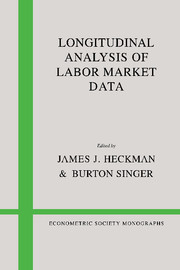Book contents
- Frontmatter
- Part I. Econometric studies
- 1 Heterogeneity, omitted variable bias, and duration dependence
- 2 Social science duration analysis
- 3 Interpreting empirical models of labor supply in an intertemporal framework with uncertainty
- 4 Alternative methods for evaluating the impact of interventions
- Part II. Statistical studies
- Part III. Sociometric studies
- Name Index
- Subject Index
2 - Social science duration analysis
Published online by Cambridge University Press: 05 January 2013
- Frontmatter
- Part I. Econometric studies
- 1 Heterogeneity, omitted variable bias, and duration dependence
- 2 Social science duration analysis
- 3 Interpreting empirical models of labor supply in an intertemporal framework with uncertainty
- 4 Alternative methods for evaluating the impact of interventions
- Part II. Statistical studies
- Part III. Sociometric studies
- Name Index
- Subject Index
Summary
Introduction
In analyzing discrete choices made over time, two arguments favor the use of continuous time models: (1) In most economic models there is no natural time unit within which agents make their decisions and take their actions. Often it is more natural and analytically convenient to characterize the agent's decision and action processes as operating in continuous time. (2) Even if there were natural decision periods, there is no reason to suspect that they correspond to the annual or quarterly data that are typically available to empirical analysts, or that the discrete periods are synchronized across individuals. Inference about an underlying stochastic process that is based on interval or point sampled data may be very misleading, especially if one falsely assumes that the process being investigated operates in discrete time. Conventional discrete choice models such as logit and probit when defined for one time interval are of a different functional form when applied to another time unit, if they are defined at all. Continuous time models are invariant to the time unit used to record the available data. A common set of parameters can be used to generate probabilities of events occurring in intervals of different length. For these reasons the use of continuous time duration models is becoming widespread in economics.
- Type
- Chapter
- Information
- Longitudinal Analysis of Labor Market Data , pp. 39 - 110Publisher: Cambridge University PressPrint publication year: 1985
- 31
- Cited by

